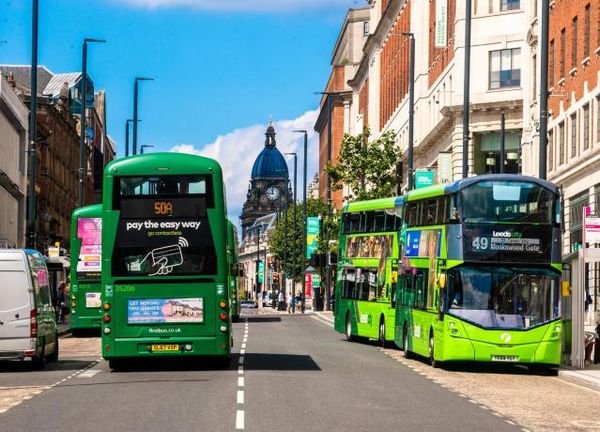Transport across Yorkshire & The Humber to be transformed with new £947m investment





Millions of people in Yorkshire and the Humber - from the York and North Yorkshire Combined Authority to Kingston Upon Hull and North East Lincolnshire - will benefit from better public transport, reduced congestion and upgraded bus and train stations as the Government continues to reallocate funding from HS2 to revolutionise transport, drive economic growth and transform communities.
Today (Monday 26 February), Prime Minister Rishi Sunak and Transport Secretary Mark Harper have confirmed that Yorkshire and the Humber will receive a £947 million funding boost from April 2025 through the Local Transport Fund to improve the transport connections that so many people rely on every day, particularly across smaller cities, towns, and rural areas.
The new investment - announced as part of Network North - will deliver an unprecedented long term funding uplift across the region over seven years. It’s the first fully devolved transport budget of its kind targeted at smaller cities, towns and rural areas, which empowers local communities and local leaders to invest in the transport projects that matter most to their communities.
Over the 7 years as a whole this funding will be on average at least nine times more than these local authorities currently receive through the local integrated transport block which is the current mechanism for funding local transport improvements in their areas.
At Cabinet today, the Prime Minister is expected to call on Ministers and MPs to hold local authorities to account to ensure the funding is used appropriately and that the voices of local communities are heard when decisions are made on where this funding goes and how this funding is spent.
This funding prioritises the forms of transport that matter most to people and will deliver for future generations – driving jobs, growing the economy, and levelling up the country.
Prime Minister Rishi Sunak said: “We have a clear plan to level up our country with greater transport links that people need and deliver the right long-term change for a brighter future.
“Through reallocating HS2 funding, we’re not only investing nearly £1 billion directly back into our smaller cities, towns and rural areas across Yorkshire and the Humber, but we are also empowering their local leaders to invest in the transport projects that matters most to them - this is levelling up in action.
“The Local Transport Fund will deliver a new era of transport connectivity. This unprecedented investment will benefit more people, in more places, more quickly than HS2 ever would have done, and comes alongside the billions of pounds of funding we’ve already invested into our roads, buses and local transport services across the country.”
The funding will be made available from 2025 to give local authorities enough time to develop their funding plans and prepare to hit the ground running to start delivering them as early as possible.
This investment will give local authorities long term certainty to invest in transformative and ambitious transport improvements from 2025 through to 2032 including:
To ensure local authorities can make the most of this unprecedented funding, the Department will publish advice for local councils and transport authorities to help them develop ambitious plans to improve local transport infrastructure in their areas.
The new funding comes as devolution deals now cover nearly 34 million, or 60% of the English population, including the recent deals for York and North Yorkshire, Hull and East Yorkshire, and Greater Lincolnshire – up from 41% since the major levelling up plan two years ago, as the Government delivers on its plan to level up the country putting power back into the hands of local communities.
Transport Secretary Mark Harper said: “Today’s £947 million investment is truly game-changing for the smaller cities, towns, and rural communities across Yorkshire and the Humber, and is only possible because this Government has a plan to improve local transport and is willing to take tough decisions like reallocating funding from the second phase of HS2.
“This new funding boost will make a real difference to millions of people living across Yorkshire and the Humber, empowering local authorities to drive economic growth, transform communities, and improve the daily transport connections that people rely on for years to come.”
The Local Transport Fund is directed to the North and Midlands because the majority of HS2 savings are from those regions. The new fund is also specifically for communities in the North and Midlands outside City Regions - who already receive City Region Sustainable Transport Settlements (CRSTS) – allowing them to deliver similar transport infrastructure upgrades in their local communities.
The South and West Yorkshire Combined Authorities already benefit from £1.4 billion of City Region Sustainable Transport Settlements from 2022-2027. They have also been allocated more than £3.5 billion in the second round of funding from 2027-2032 to improve transport across Yorkshire and the Humber in the long term, funded in part from reallocated HS2 funding.
This investment demonstrates our commitment to reinvest all of the £19.8 billion from the Northern leg of HS2 in the North and all of the £9.6 billion from the Midlands leg in the Midlands, while the £6.5 billion saved through the new approach at Euston will be spread across every other region in the country.
Lord Patrick McLoughlin, Chair of Transport for the North, said: “We welcome this funding for our local transport areas as a sign of progress towards transforming the north to a more inclusive, sustainable and better-connected region. By having greater clarity on the funding that’s available, and consolidating funding streams, it helps remove inertia and accelerates delivery on the ground.
“TfN look forward to working with government and local leaders, because we know that the travelling public will get better results the more locally the decisions are made on how those services should be provided.”
The Government’s plan to transform British transport is already delivering for people. The North is also set to benefit from a brand-new rail station at Bradford, £2.5 billion for a West Yorkshire Mass Transit System for Leeds, and the electrification of the rail line from Sheffield to Hull – all delivered by Network North.
Today’s announcement also follows £991 million to resurface hundreds of miles of local roads across Yorkshire and the Humber with the first tranche of funding already being delivered, right from this financial year.
We’ve also invested over £200 million to extend the £2 bus fare cap in England outside London until the end of 2024 and will spend £1 billion to improve bus services in the North and the Midlands, with £150 million delivered from April this year. Since the £2 bus fare cap was introduced across England on 1 January 2023, millions of passengers have benefitted from lower fares.
The Government is also investing £1.5 billion in Levelling Up projects for people and businesses across Yorkshire. This includes £48 million for major upgrades to the Penistone line in Yorkshire to help reliability of rail travel between Sheffield and Huddersfield. The funding will also help provide enhanced station facilities such as electric vehicle charging points, car clubs, cycle hire and parcel delivery lockers.
Taken together, these investments are all part of the government’s plan to build a brighter future for generations to come by levelling up transport infrastructure across the country.